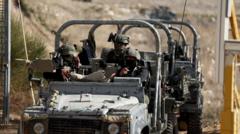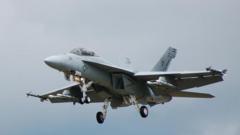Amidst the chaos in Syria, Israeli forces have launched a series of extensive operations targeting Syrian military capabilities, raising concerns over regional implications and commitments to international law.
**Israel's Military Maneuvers Amid Syrian Turmoil: A Strategic Gamble**

**Israel's Military Maneuvers Amid Syrian Turmoil: A Strategic Gamble**
Israel intensifies airstrikes in Syria, taking advantage of the tumultuous regime change to seize military assets.
Israel has firmly positioned itself to exploit the ongoing disarray in Syria, taking bold military action following the apparent collapse of the Assad regime. Israeli troops have established control on Mt. Hermon (Jabal al-Sheikh), providing a strategic vantage point over the capital, Damascus. Over the past few days, the Israel Defense Forces (IDF) have executed more than 350 airstrikes, purportedly dismantling around 70-80% of Syria's military arsenal, targeting vital assets from aircraft to naval ships and weaponry depots.
With the Syrian military's command structure in chaos and numerous key locations devoid of personnel, Israel sees an opportune moment to reshape the military landscape. Israeli Defense Minister Israel Katz stated that the navy's actions had successfully targeted the Syrian fleet, while the IDF moved ground forces into regions of southern Syria, aiming to create a "sterile defense zone" free from weapon threats without establishing a permanent presence.
Commenting on the intensity of the operations, military analysts highlighted that many of the strikes were based on plans developed years earlier. The IDF's actions have evoked mixed reactions, with one Israeli commentator acknowledging the unprecedented scale of the attacks, describing their impact as effectively returning the Syrian military capabilities to a nascent stage.
Israeli officials assert that their military engagement aligns with national security interests, primarily aimed at preventing weapons from falling into the hands of extremist factions, including Hezbollah, a former ally of Assad. Prime Minister Benjamin Netanyahu reiterated that Israel would not tolerate threats from across its borders.
Despite Israel's perspective of acting out of self-defense in light of the altered geopolitical landscape, the international community has expressed concern. UN peacekeepers, stationed in a buffer zone following the 1973 conflict, emphasized the need for unhindered operations, deeming Israel's recent troop movements a potential violation of ceasefire agreements. Several Arab nations, along with France and Germany, characterized the actions as encroachments on Syrian sovereignty, urging Israel to withdraw its forces.
While the United States has advised Israel to limit its incursion to a temporary measure, within Israel, there exists considerable public backing for the military's proactive stance. Reports in Israeli media underscore a heightened awareness of potential threats, especially with the rise of Islamist entities like Hayat Tahrir al-Sham (HTS), labeled a terrorist organization. The military establishment's robust response post a recent attack by Hamas reflects a broader strategic lesson for Israel—mistakes in interpreting adversarial actions can no longer be afforded.
As the situation evolves, regional stability hangs in the balance, with many stakeholders carefully observing Israel’s newfound military assertiveness in a severely altered Syrian landscape.
With the Syrian military's command structure in chaos and numerous key locations devoid of personnel, Israel sees an opportune moment to reshape the military landscape. Israeli Defense Minister Israel Katz stated that the navy's actions had successfully targeted the Syrian fleet, while the IDF moved ground forces into regions of southern Syria, aiming to create a "sterile defense zone" free from weapon threats without establishing a permanent presence.
Commenting on the intensity of the operations, military analysts highlighted that many of the strikes were based on plans developed years earlier. The IDF's actions have evoked mixed reactions, with one Israeli commentator acknowledging the unprecedented scale of the attacks, describing their impact as effectively returning the Syrian military capabilities to a nascent stage.
Israeli officials assert that their military engagement aligns with national security interests, primarily aimed at preventing weapons from falling into the hands of extremist factions, including Hezbollah, a former ally of Assad. Prime Minister Benjamin Netanyahu reiterated that Israel would not tolerate threats from across its borders.
Despite Israel's perspective of acting out of self-defense in light of the altered geopolitical landscape, the international community has expressed concern. UN peacekeepers, stationed in a buffer zone following the 1973 conflict, emphasized the need for unhindered operations, deeming Israel's recent troop movements a potential violation of ceasefire agreements. Several Arab nations, along with France and Germany, characterized the actions as encroachments on Syrian sovereignty, urging Israel to withdraw its forces.
While the United States has advised Israel to limit its incursion to a temporary measure, within Israel, there exists considerable public backing for the military's proactive stance. Reports in Israeli media underscore a heightened awareness of potential threats, especially with the rise of Islamist entities like Hayat Tahrir al-Sham (HTS), labeled a terrorist organization. The military establishment's robust response post a recent attack by Hamas reflects a broader strategic lesson for Israel—mistakes in interpreting adversarial actions can no longer be afforded.
As the situation evolves, regional stability hangs in the balance, with many stakeholders carefully observing Israel’s newfound military assertiveness in a severely altered Syrian landscape.




















